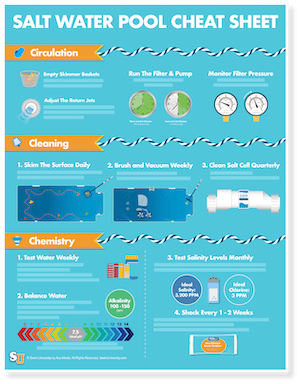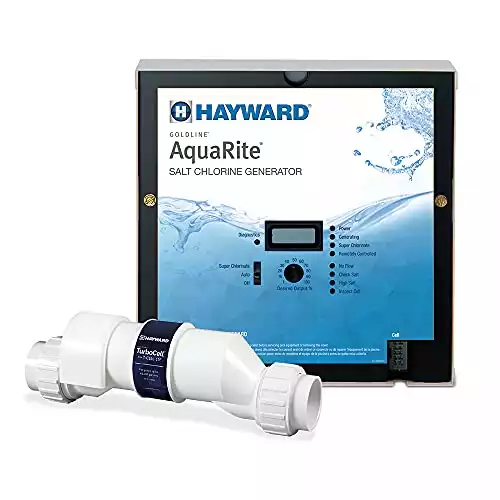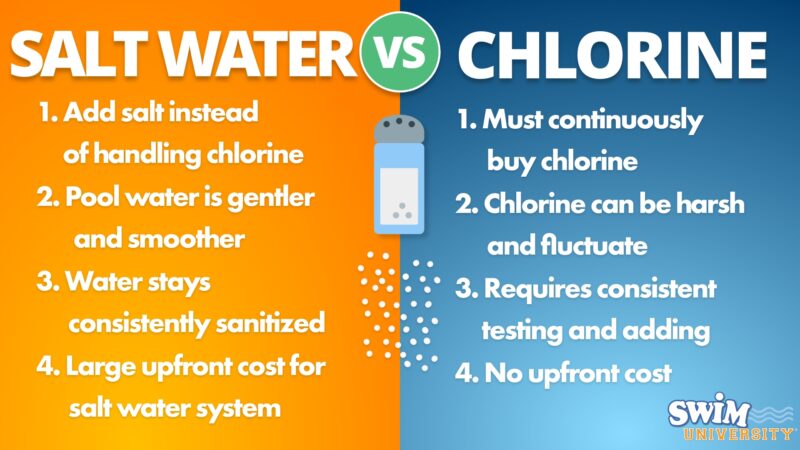Which one is best: a salt water pool vs. a chlorine pool? Salt water pools tend to have gentler, smoother water than other pools. And you only need to add salt to your water once or twice a year to keep things sanitized. But you’re still technically swimming in water with chlorine. And salt water generators are expensive to buy and more complicated to maintain.
So before you switch the type of pool you have, here’s everything you need to know about salt water pools vs. chlorine pools. Watch the video below or keep reading for the complete guide.
How Does a Salt Water Pool Work?
A salt water pool uses a salt water generator, also known as a salt water chlorine generator. Through electrolysis, the salt water generator converts salt in your pool into chlorine.
This salt water generator (or salt water chlorinator) has a high/low salt and temperature indicators to help protect your equipment. And the self-cleaning salt cell makes regular maintenance easy. Check out their models for both inground and above ground pools.
That’s right: a salt water pool is sanitizing your water with chlorine. But instead of buying and adding chlorine tablets or granules to your water, you’re buying and adding pool-grade salt.
As that salt stays in the water, getting recycled and reused by the generator as it continues to maintain your chlorine levels. Again: this is NOT a chlorine-free alternative to a traditional chlorine pool. It’s just a different process of making chlorine.
Salt water swimming pools usually need salt levels of 3,000 ppm (parts per million) before the salt chlorine generator start working. And that’s the same amount of salinity as human tears. So salt water pool owners won’t find the water incredibly salty, like ocean water.
By the way, if you need more help with pool maintenance and making choices about your pool, be sure to check out our Pool Care Video Course!
Frustrated by adding chemicals and trying to keep your pool clear all the time?
We cut out all the confusion of pool maintenance in this easy-to-read illustrated ebook and video course. It'll help you save $100 right away on pool care!
Click Here to Learn MoreBenefits of a Salt Water Pool vs. Chlorine Pool
Here are a few reasons why a salt water system is a great investment.
1. You add salt to your water instead of chlorine
Handling pool-grade salt is a lot safer and easier than chlorine pucks or granules. And as the salt water generator uses the salt to produce chlorine, the salt gets recycled back into the water and reused again. That means you usually only add salt at the beginning of the pool season or if a heavy rainstorm dilutes your pool water.
It also means less maintenance constantly buying, adding and adjusting your chlorine levels. And pool-grade salt is much cheaper and simpler to buy than chlorine. A salt water pool can be worth it just to never have to handle chlorine again!
2. The water is gentler and smoother
Salt water pools have smoother, silkier water. Some sensitive swimmers who are normally irritated by chlorine pools find salt water pools to be much gentler. And it tends to be less corrosive to swimsuits, too.
3. Chlorine levels stay stable
Because the salt water generator monitors and releases a slow, steady output of chlorine, the chlorine levels stay consistent. And since the chlorine levels are consistent, salt water pools can avoid problems like algae and cloudy water. Fewer drops in chlorine levels also mean fewer chloramines, which is a chlorine byproduct that causes that nasty, chlorine-like smell in pools.
Downsides of a Salt Water Pool vs. Chlorine Pool
As great as a salt water pool seems, there are a few drawbacks to a salt water pool vs. a chlorine pool, including the upfront cost and ongoing equipment maintenance.
1. It’s an expensive initial investment
It can cost several thousand dollars to convert a chlorine pool to a salt water system. That includes purchasing the salt water generator, or salt chlorine generator, and the labor to install it.
2. Maintenance is more complex and expensive
Salt water generators and the salt cells inside need to be inspected and cleaned regularly. And you’ll need to replace your salt cell every 3-7 years, which can cost another few hundred dollars. While you won’t need to constantly buy chlorine tablets or granules, you will need to use more electricity to keep your salt water generator running and producing chlorine. And if you ever need any major repair or maintenance to your system, you’ll likely need to hire a specialized professional.
3. It’s not totally hands-free
While it’s easy to get excited about never having to manually add chlorine to your water again, you’ll still need to perform regular pool maintenance checks on your water and your salt water system. This includes regularly testing your water, especially your pH. pH levels tend to drift higher in salt water pools. And pH above 7.6 can lead to skin irritation, burning eyes, and calcium build-up or scaling on your pool equipment.
Be sure to check out our guide on 9 Common Salt Water Pool Maintenance Mistakes for more help.
4. Salt water generators don’t work in colder temperatures
Salt water pool systems won’t produce chlorine if your water is 60 degrees Fahrenheit or below. So if you’re in a colder climate without a heater, your chlorine production will stop when your water temperature drops too low.
5. It can corrode pool parts
While salt water isn’t harmful in average doses, it can start to break down equipment if it starts to build up. Automatic pool covers, pool liners, metal pool equipment, and even natural stonework or landscaping near the pool can start to erode with too much salt water exposure. So keep an eye out for exposed metal components, especially on vinyl pools. But fiberglass pools are generally more safe from salt water corrosion.
Which is Better: Salt Water vs. Chlorine Pool?
Whether you have an above ground pool or an inground pool, the pros of a salt water pool are the same:
- You won’t need to constantly buy and add chlorine to your water.
- It’s gentler on your skin and eyes with a softer, silkier feel.
- Your chlorine levels will remain stable, keeping your water sanitized.
But here are the cons of a salt water pool:
- It comes with a higher initial cost and ongoing maintenance costs.
- You may experience chronically high pH levels.
- You’ll need to monitor your salt water generator
- Salt water may corrode some swimming pool fixtures
Overall, if you can afford the initial investment, the costs between salt water vs. chlorine pools even out. Given the lifespan of a salt water generator and how often you’ll need to repair or replace parts, you’ll probably spend the same as you would maintaining a chlorine pool. But it’s worth it for a better swimming experience and never having to handle a chlorine tablet again.
Need More Pool Maintenance Help?
- Download our free Pool Care Cheat Sheet. It’s a free, easy-to-use guide to help you keep track of taking care of your pool.
- Subscribe to our Swim University YouTube Channel. We publish free video tutorials throughout the pool season.
- Check out our Pool Care Course. You’ll get 30+ step-by-step videos and a downloadable guide with everything you need to know about pool maintenance.

Recommended Guides
You could pour kitchen salt into your pool. Or you can make it easier on yourself. The right kind of pool salt will work better and save you money.
Been dreaming about a salt water pool? Dream no more! You can get softer water and less maintenance with a salt chlorine generator.
Salt water pools are different than traditional pools. So here are the common salt water pool maintenance mistakes and how to avoid them.
Wondering how much salt to add to your pool? Here's a simple formula for figuring out how many bags of salt you need.



